Probiotics are “good bacteria” that live in your stomach and digestive tract. Healthy levels of the right probiotic bacteria are linked to everything from good digestion to staying at a healthy weight.
Probiotics are one of the hottest topics in medical and nutritional research right now, in large part because the probiotic makeup of your “gut flora”–the bacteria that live in your digestive tract–seems intrinsically linked to your health.
Obese people have different gut bacteria than lean people, healthy people have different gut bacteria than sick people, and men have different gut bacteria than women.
This last point is worth considering: given that women face a number of health issues that men do not, it only makes sense that a woman would want to take a probiotic supplement that was specifically formulated for her biology if her goal is to stay healthy.
Some probiotic supplements are bound to work better for women than others. Our research team has evaluated and ranked the best probiotic supplements for women according to the latest research on optimal probiotic supplement formulation.
Research
Rankings
1. 1MD Complete Probiotics
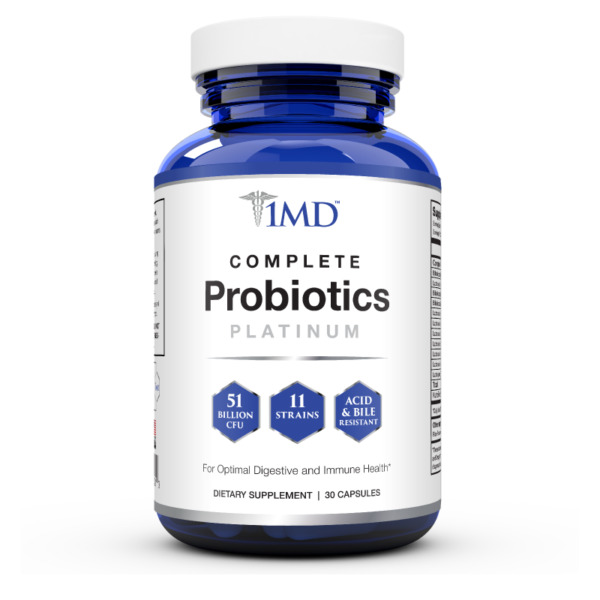
Click here for the lowest price
1MD Complete Probiotics is simply one of the most effective, and well-researched probiotics you can buy today. Each capsule comes with 51 billion live CFUs and 11 different strains for maximum biodiversity. This means that it has a much better chance of creating a healthy, balanced gut biome.
What puts 1MD’s probiotic in a class all to its own is that all of its strains are designed to be acid and bile resistant, giving them the best chance to grow and thrive in your gut. On top of this, these capsules are vegan, non-GMO, Gluten Free, Soy Free, and Preservative Free.
Women suffer from IBS, constipation, and inflammatory bowel disease more commonly than men, which makes it all the more important that you guard your gut with the best probiotics you can find. That’s what 1MD’s complete probiotics is, a better, more effective probiotics supplement. That’s why it’s our number 1 choice for 2020.
2. Garden of Life RAW Probiotics Women 50 & Wiser
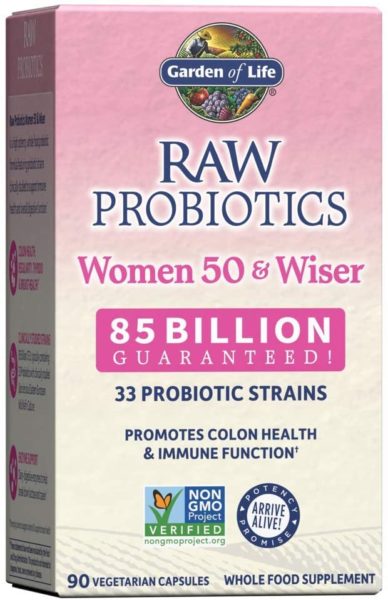
Garden of Life’s M.O. is providing supplements that derive their ingredients from natural ingredients, and their RAW Probiotics supplement for women age 50 and older is an excellent example of the strengths of this approach.
It includes an eye-popping 85 billion CFUs, and 33 different strains of probiotic bacteria. These come from fermented natural products such as kefir and yogurt; as a result, the bacterial biodiversity is large, and the supplement also provides a tremendous amount of additional vitamins and minerals.
3. Nature’s Way Fortify Women’s Probiotic
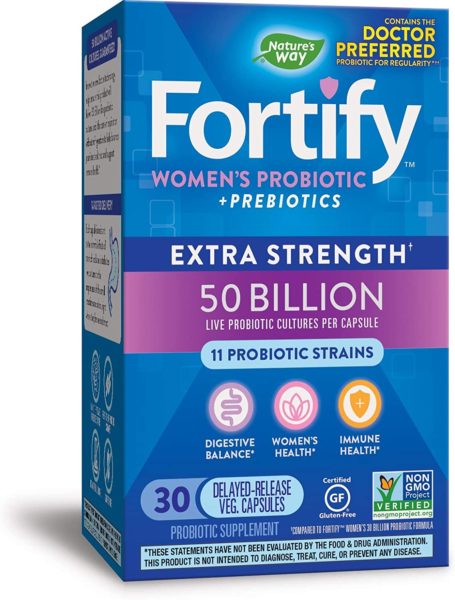
Nature’s Way provides a high dose of a broad spectrum of probiotic bacteria. The 50 billion CFUs are divided more or less evenly among lactobacillus and bifidobacterium strains, with 30 billion and 20 billion CFUs each.
If you are really in to the science of probiotics, Nature’s Way even specifies the exact strain of each bacteria that it uses (e.g. lactobacillus acidophilus La-14), so you can cross-reference it with research to see what studies have supported these particular strains.
Thanks to the variety of probiotics and the high dosage, it’s a top pick.
4. Garden of Life Probiotics Ultimate Care
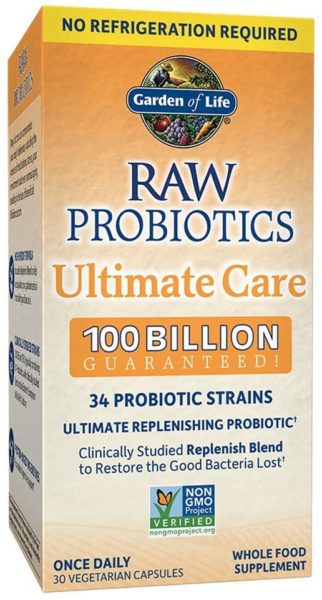
For unparalleled variety and potency, Garden of Life Ultimate Care is a great option. Athletes, aggressive dieters, and others who put a lot of stress on their body can rely on the wide variety and powerful dosage of the 34 different probiotic strains in this supplement.
This supplement also includes some “pre-biotics” in the form of fibers and nutrients that the bacteria can consume to multiply, ensuring these probiotics take root in your body.
5. Physician’s Choice Women’s Probiotic
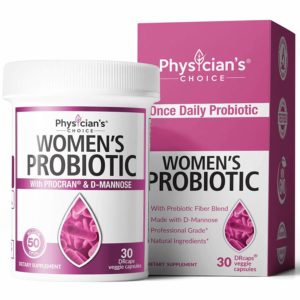
Physician’s Choice makes a heavy-hitting 50 billion CFU women’s probiotic supplement that focuses mostly on specific strains of Lactobacillus bacteria. It’s a good option for a general-purpose probiotic that’s tailored for women, and it’s great to see Physician’s Choice specifying the exact strain of each type of bacteria used in making the supplement.
6. RenewLife Women’s Care Ultimate Flora
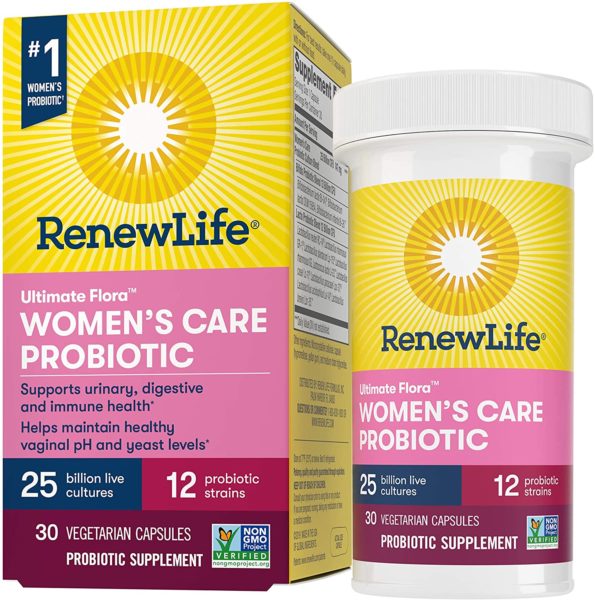
With 10 probiotic bacteria strains and 25 billion CFUs, RenewLife has a solid women’s probiotic. The bacteria content is heavy on the lactobacillus varieties, which make up 22.5 of the 25 billion CFUs.
The balance is made up of bifidobacterium strains. Since the lactobacillus strains are the most-studied, this makes sense, and this probiotic is a strong choice if you want to stick with the best-researched types of bacteria.
7. NatureWise Women’s Care Time Release Probiotics
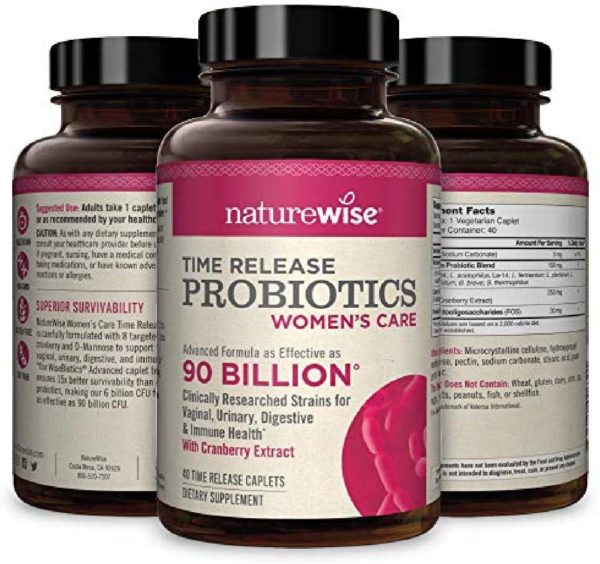
NatureWise offers a women’s probiotic that branches out a bit from the traditional bacterial strains. It includes less common strains like Streptococcus thermophilus, which has been researched for its anti-inflammatory properties and its use in diseases like ulcerative colitis.
This is a good choice if you want to diversity your gut bacteria or try something different, but it may not be as useful if you need to repopulate your gut flora, for example if you’ve just gotten off antibiotics for an ear infection.
8. Culturelle Women’s Healthy Balance
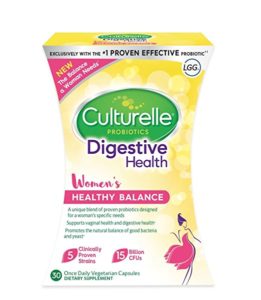
Culturelle provides a concentrated supply of just five probiotic bacterial, all of them variants of lactobacillus. The supplement delivers 15 billion total CFUs, so you know that the dosage of each probiotic is quite high.
If you’ve done your research and just want to deliver a large amount of lactobacillus bacteria, Culturelle is a good choice.
9. Vitamin Bounty Women’s Pro Daily
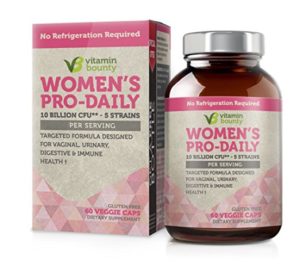
At 10 billion CFUs and five different probiotic strains, Vitamin Bounty is fairly middle of the road with their women’s probiotic. None of the bacterial strains are particularly innovative, though the presence of fructooligosaccharides (essentially bacteria probiotic food) as a prebiotic ingredient is good to see.
10. Hyperbiotics PRO-Women
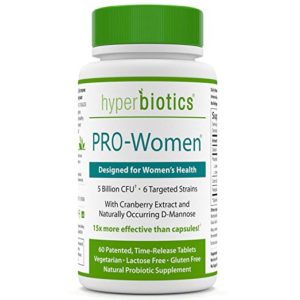
Hyperbiotics PRO-Women is a probiotic supplement that provides a disappointingly low amount of bacteria, both in terms of variety and in terms of colony forming units. At only six strains of bacteria and 5 billion CFUs, the actual amount of each bacterial strain is fairly low.
Category winners
Best probiotics for women overall: 1MD Complete Probiotics
With over 50 live CFUs and 11 different strains of probiotic bacteria, it’s impossible to match the dosage and variety of 1MD Complete. For women looking for an all-around standout probiotic, 1MD should be your first choice.
Best probiotics for women over 50: Garden of Life Raw Probiotics Women 50 & Wiser
Garden of Life pairs their highly-regarded probiotic bacteria selection with trace vitamins and minerals like copper, selenium, and manganese, which help these bacteria thrive in your body. For this reason, Garden of Life is our recommendation for older women.
Best probiotics for women’s weight loss: 1MD Complete Probiotics
The potent dosage and wide variety of bacteria in 1MD make it a great choice for women looking to lose weight. Unhealthy gut bacteria have been implicated in causing obesity, so resetting that gut flora with a more diverse set of healthy bacteria might help you meet your weight loss goals.
Best women’s probiotics for stomach problems: Nature’s Way Fortify Women’s Probiotic
As with reproductive health, women searching for a solution to stomach problems may benefit from a smaller number of highly selective probiotic bacteria versus a broad-spectrum approach. Nature’s Way is the market leader on this front.
Best probiotics for female athletes: Garden of Life Ultimate Care
In terms of potency, Garden of Life Ultimate Care is unparalleled, with 100 billion CFUs and 34 different probiotic strains. The high demands of serious athletes can put more stress on the gastrointestinal system, and using a powerful probiotic could be a strong countermeasure.
Best probiotics for women with yeast infections: Nature’s Way Fortify Women’s Probiotic
To bolster the ranks of good bacteria in your reproductive system, Nature’s Way uses a carefully-chosen selection of specific probiotic bacteria strains that have demonstrated their effectiveness in clinical research. For specific problems like yeast infections, a targeted approach is your best bet.
Who should buy probiotics for women?
Your gut bacteria play a role in some of the most important aspects of health: a healthy gut microbiome is related to everything from keeping yourself at a healthy weight to gastrointestinal function to maintaining good mental wellbeing.
Probiotics are supplements that are specifically designed to supply your body with beneficial bacteria that have been associated with these types of outcomes.
Often, these bacteria are the kind of microbes that occur in fermented foods like cheese, yogurt, kimchi, and kombucha. Probiotics provide live cultures of these bacteria at much higher concentrations than what you’d get in food sources.
Women’s specific probiotic needs can be different than men’s, and women can garner some distinctive benefits—resistance to urinary tract infections, for example, which are much more common in women than in men, as well as protection against yeast infections.
If you are a woman who is consistently encountering gastrointestinal problems like gas, bloating, and diarrhea, or if you have a history of yeast or urinary tract infections, a probiotic supplement might be just what you need.
New research even suggests that probiotics can be useful for treating and preventing allergies, and some of the latest science coming out also suggests that taking a probiotic supplement might be a good idea for women looking to lose weight as well. Women looking for these specific health benefits should strongly consider a probiotic supplement.
How we ranked
The benefits of a probiotic supplement are directly related to two important properties: first, the specific strains of bacteria used, and second, the dosage of these strains. We used both of these properties to form our rankings.
In terms of bacterial strains, we looked to the scientific literature to inform what types of bacteria and what strains have been associated with specific health benefits. We tailored these benefits to women by putting more weight on bacterial strains that have been associated with protection against yeast infections and urinary tract infections.
Probiotic bacteria come in many different species, which exist within different genera, or families. The most common of these categories of probiotic bacteria are the Bifidobacterium and Lactobacillus genera, which contain common probiotic bacteria like Lactobacillus acidophilus, Bacillus breve, and Lactobacillus plantarum.
Within a specific species, like Lactobacillus acidophilus, there are specific strains, or sub-types of bacteria. These are the types that are studied in scientific research. Scientists go to great lengths to point out that just because one strain of a certain bacteria has health benefits does not mean that a different strain of the same species is going to share these benefits.
As such, whenever possible, we tried to match the specific strains of probiotic bacteria in the supplements on our list of candidates to the strains used in scientific research that have been linked to specific health benefits we were looking for.
In terms of dosage, the measure of efficacy is CFUs, or colony forming units. These number in the billions, and count the number of live bacteria that exist in a probiotic supplement.
Since virtually no research studies have used less than five billion CFUs per day as their dosage with any success, we set this as the lower limit for probiotic supplements to be included in our rankings—anything with a lower dose got eliminated.
We gave extra weight to probiotic supplements that used a higher dosage, since some of the more successful clinical trials have incorporated doses of 50 billion CFUs per day or more.
Finally, we applied our usual criteria for purity and good supplement design, giving extra points to supplements that followed good manufacturing processes, disclosed the specific strains of bacteria that they used.
Since probiotic supplements for women contain active, living bacteria, we also awarded extra points for supplements that provided some form of prebiotic material, which functions as ‘food’ to help these microorganisms grow and multiply. We were left with our final list of the best probiotics for women that are available on the market.
Benefits
A healthy population of gut bacteria is beneficial when it comes to digestive health, immune function, maintaining a healthy weight, and more. Women can benefit in particular from the ability of probiotics to improve vaginal health and reduce the risk of yeast infections. The gut flora–the bacteria that live in your digestive tract–are increasingly becoming the focus of medical and nutritional research.
You actually carry more bacterial cells in your body than you do human cells, and because of this, many researchers feel that what’s known now about the benefits of probiotic bacteria is likely only the tip of the iceberg.
Probiotics can help improve digestive problems. The initial research on gut bacteria focused on digestive problems.
This makes sense, given that probiotic bacteria live in your digestive tract. According to a 2003 scientific article by researchers in France, probiotics improve digestive health by increasing the resilience of the intestinal wall to destructive agents, improving digestive mobility, and reduce disease-related changes to intestinal structure (1).
This means that probiotics can be helpful for conditions ranging from diarrhea to constipation to irritable bowel disease and ulcerative colitis. As just one example, a 2009 study showed that a probiotic preparation was able to induce remission in almost half of patients with mild to moderate ulcerative colitis (2).
Lactobacillus and bifidobacterium are the probiotics with the strongest evidence supporting their use for digestive problems. These two families of bacteria contain many different strains, but a host of research supports their use.
A 2015 review article published in the journal Biomed Research International concluded that strong evidence supports the use of both lactobacillus and bifidobacterium strains for a range of conditions related to inflammatory bowel disease.
As such, a tremendous amount of research has focused on specific strains of these two probiotic bacteria. Most of the science you’ll find–and most of the science cited here–looks at probiotic bacteria strains from these two families. This is not to say that other strains are not effective, though; the evidence likely just isn’t in yet.
Probiotics can help women treat or prevent yeast infections and urinary tract infections. Both of these infections are the result of harmful bacteria or fungi colonizing the urinary or genital tract, and what allows them to take hold and reproduce is often a lack of healthy bacteria that would otherwise crowd out the harmful pathogens that cause yeast and urinary tract infections.
According to a scientific article by two doctors at the University of Western Ontario in Canada, probiotic treatments are increasingly becoming an accepted method of treatment in women with genital or urinary tract infections (3).
So far, the probiotic strains that have been researched the most for this use are of the lactobacillus variety, which partly explains why many women’s probiotics focus especially heavily on these bacteria.
Probiotics can improve your immune function and even treat allergies. The research in this area is still in its infancy, but a slew of promising studies suggest that probiotic supplements boost the function of your immune system by increasing its ability to destroy harmful bacteria in your body.
Additional research suggests that probiotics may even be able to alleviate allergies by helping to focus your immune system on harmful compounds and not on allergens (4).
A probiotic supplement might help slow down bone turnover in postmenopausal women. There’s a surprisingly close link between your gut health and your overall hormonal profile, and new research suggests that this link could be extended to include the hormones that affect your bone metabolism.
This could be useful for older women, whose hormonal profile changes in a way that’s deleterious for bone strength as they get older. A study published in 2017 tested the effects of a multi-species probiotic supplements in 50 post-menopausal women by splitting up the women into two groups: a placebo group and a probiotic group (5).
Both groups received a calcium and vitamin D supplement to take on a daily basis, but the probiotic group received a seven-species supplement in addition. The probiotic supplement contained several species of Lactobacillus, two species of Bifidobacterium, and one species of Streptococcus bacteria, alongside fructooligosaccharides as a prebiotic.
The researchers followed the subjects over the course of six months, and tested their bone density levels and their blood hormone levels before and after the supplementation program.
Compared to the group on the placebo, the group of women who took the probiotic supplement didn’t increase their bone density, but they did experience hormonal changes that were consistent with a decrease in bone turnover.
While more research is needed to confirm the findings of this fairly small study, it does suggest that probiotics might help slow down the rate of bone loss in some older women.
Moreover, another useful finding from this study is the idea that probiotics could combine well with calcium and vitamin D, if you are looking to improve your bone health with a supplement combination.
Side effects
Probiotics are exceptionally safe, with virtually all gastroenterologists endorsing them as safe and effective treatments for digestive problems (6).
A scientific review published in 2006 by researchers at the University of Melbourne in Australia specifically examined the risks associated with probiotic use, but identified only a few scenarios in which probiotics carry risks (7).
Specifically, the authors recommended care when probiotics were used in premature infants and people with compromised immune systems, such as recipients of organ transplants.
Outside of these individuals, the authors write, probiotics have an excellent safety profile.
Recommended dosage
As you might expect for a new frontier in medicine and nutrition, dosages in clinical trials of probiotics are all over the board.
There’s somewhat of a disconnect between the scientific studies that examine the medical benefit of probiotics and the supplements that are available on the market–most studies investigate one individual bacterial strain, while most probiotic supplements for women incorporate many different strains. Still, some rough guidelines can be drawn.
Almost all clinical studies use a daily dosage of at least 10 billion colony forming units (CFUs), and many use 50 to 100 CFUs per day.
The intervention periods are often long; most studies are 6 months or 12 months in duration. This indicates that it may take some time to see the full benefits of probiotics manifest themselves.
As such, aim for a high dosage of probiotics, and take them on a regular basis for at least a few months before making a decision on whether they are helpful.
FAQ
Q: What can probiotics do for women over 50?
A: Women over 50 are particularly prone to getting urinary tract infections because of hormonal changes in the reproductive system that occur during and after menopause.
These women can particularly benefit from the increased bacterial diversity that you can achieve with a probiotic supplement formulated for women. Yeast infections actually become less common after menopause, but older women are still at risk: a probiotic supplement may help reduce this risk.
Additionally, though the evidence is preliminary, one small study did find some circumstantial support for a connection between probiotic supplementation and improved bone health in post-menopausal women. These benefits, of course, all stack on top of the gastrointestinal health benefits that are associated with probiotic supplementation generally.
Q: Why should a woman take probiotics?
A: Women get all of the usual potential benefits from probiotics, which include improved gastrointestinal health, relief from conditions like bloating and cramping, weight loss, fat loss, as well as less systemic inflammation in the body.
Further, research suggests that probiotics might help women reduce their risk of developing urinary tract infections and yeast infections. Both of these conditions can occur when the healthy bacteria in your reproductive tract get out of balance, and pathological bacteria invade.
Probiotic supplements help reinforce your body’s supply of healthy bacteria, making it harder for infection-causing microbes to take hold.
Q: Can women benefit from probiotics for weight loss?
A: Lab research shows a strong connection between the content of your gut microbiome and your body weight. People who are thin have a very different bacterial population in their gut than people who are overweight or obese.
However, using probiotics to alter this bacterial population to generate weight loss is still in the early stages of research.
For example, a 2015 review and meta-analysis pooled results from four randomized controlled trials of using probiotics for weight loss, and found no significant effects on BMI or body weight (8). However, the researchers noted that the quality of these studies was variable, and more research was needed.
In contrast, another review just three years later found significant improvements in weight loss and significant decreases in inflammation thanks to probiotic supplementation, marking a major shift in the balance of evidence (9).Indeed, another 2018 study found significant decreases in body mass and body fat percentage (10).
Q: What is the difference between a prebiotic and a probiotic supplement?
A: Though prebiotics and probiotics have similar names, they serve two distinct purposes. A prebiotic contains ‘food’ for bacteria, like fiber, inulin, chicory root, and fructooligosaccharides.
Prebiotic supplements are great if you already have a strong gut microbiome and are looking to maintain its health, or if you are already taking a dedicated probiotic supplement and want to do everything you can to ensure that the probiotic bacteria you are taking are able to proliferate and repopulate your gastrointestinal tract.
A probiotic is the better choice if you are having the kinds of problems that are associated with poor balance in your gut bacteria, like gas, bloating, gastrointestinal distress, frequent yeast or urinary tract infections, or problems when trying to lose weight.
Probiotic supplements are great for women who want to deliver a large dose of bacteria to their body on a consistent basis.
If you’re only going to take one, for most people a probiotic is a better choice. A prebiotic is for more advanced users who already have their gut biome moving in the right direction.
Q: What foods have probiotic bacteria in them?
A: Foods rich in probiotic bacteria are inevitably fermented. Dairy is the most common and most easily available source of probiotic bacterial strains—many of the Lactobacillus genus of probiotics can be found in fermented dairy products like yogurt, cheese, and sour cream.
Other fermented foods, like kimchi or kombucha, are also rich in probiotic bacteria strains. However, the concentrations of these probiotic bacteria in food tends to be a lot lower than what you can achieve with a probiotic supplement.
For example, yogurt products only need to have one billion CFUs of probiotic bacteria per serving to label themselves as “probiotic,” even though you can easily get 10 to 25 times as many CFUs of bacteria in a single serving of a probiotic supplement.
The same applies to other probiotic foods: the probiotic bacteria that you have naturally in your body are the result of gradual accumulation over the course of years on a certain diet; if you want to make changes to your body’s microbiome in the short term, you need much higher doses than are easily achieved in foods.
Q: What is the best probiotic to take for young women?
A: Young women are more prone to yeast infections, so they may benefit from bacterial strains that have been studied more intently for their benefits on the reproductive tract.
These strains include Lactobacillus rhamnosus, Lactobacillus fermentum, Lactobacillus acidophilus, Bifidobacterium lactis, and Bifidobacterium longum.
Researchers are still trying to tease out which specific strains of bacteria confer the most benefit, but these species listed above do have supporting research backing them up (11).
Q: Is it good to take probiotics when you are pregnant?
A: As of right now, there is no conclusive evidence on whether or not probiotics are beneficial during pregnancy. A study published in 2018 in the journal BMC Pregnancy and Childbirth conducted a pooled analysis of several studies on women taking prebiotics and probiotics (12).
The researchers looked at results from 27 different studies, and found no significant differences in rates of preterm birth, gestational diabetes, and other negative infant and maternal health outcomes.
While this is disappointing if you were hoping to use probiotics like a prenatal vitamin to increase your chance of giving birth to a healthy baby, it also provides some good evidence that probiotics are safe to take during pregnancy. Still, you should talk to your doctor if you have any questions.
Related articles
Recap
Probiotic supplementation is a rapidly expanding field of medical and nutritional study. Probiotic supplements appear to help improve digestion, digestive tract health, and treat or prevent yeast and urinary tract infections in women.
A probiotic supplement may also boost the functioning of your immune system and could even alleviate allergies. With an excellent safety profile and no expected side effects in healthy adults, probiotics are one of the best supplement choices you can make for improving your overall health with little risk.
Look for a probiotic supplement that provides a large dosage of colony forming units: at least 10 billion CFUs is a good starting place.
If you are trying to treat a specific health problem with probiotics, make sure the bacterial strains in the supplement you buy match the strains used in medical research (so, for example, lactobacillus strains for treating and preventing urinary tract infections).
For BodyNutrition’s #1 recommended probiotic for women, click here.